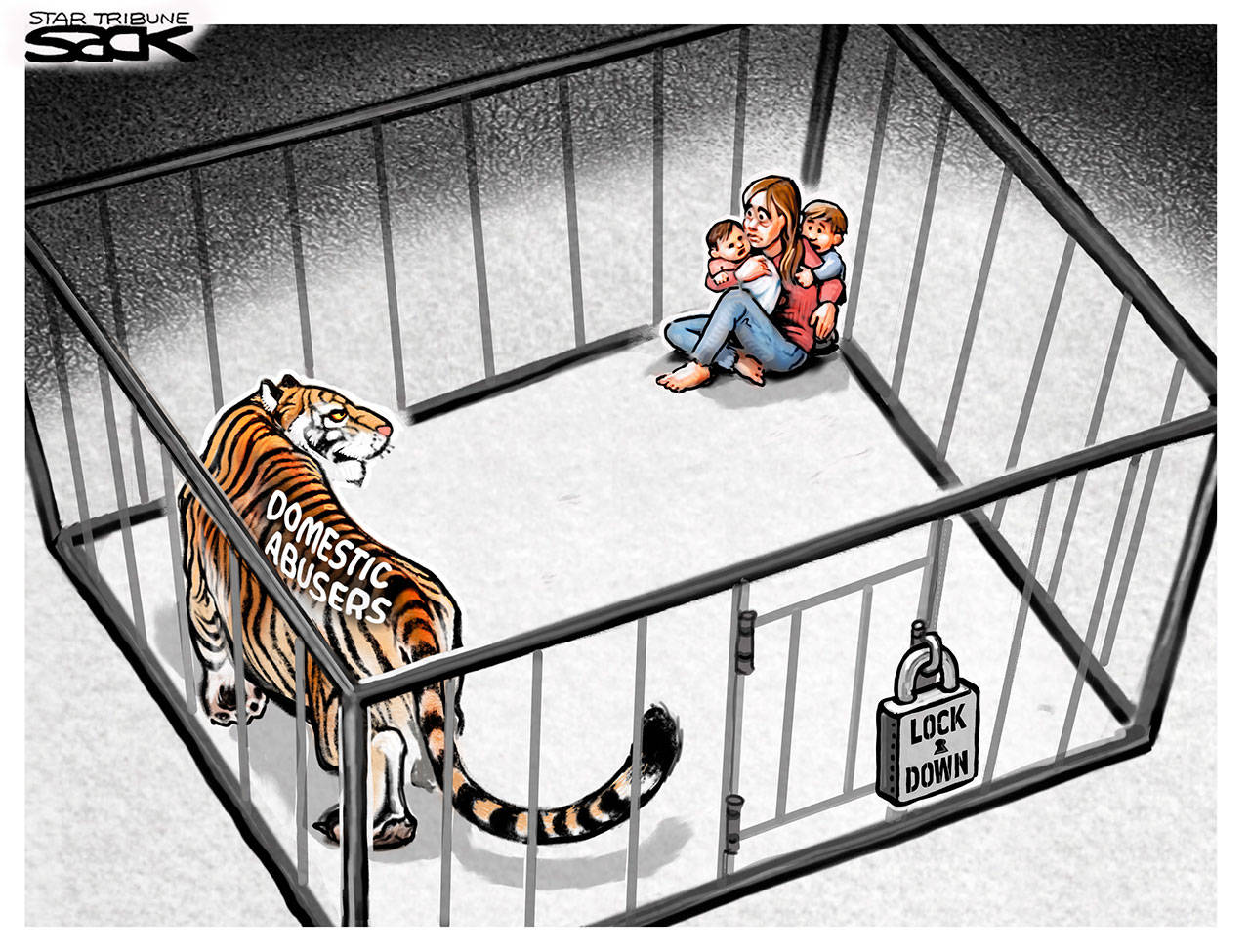By The Herald Editorial Board
A decision by two of the state Legislature’s leading Republicans poses a threat not just to victims of domestic violence, stalking and sexual assault but, as well, to the state’s law enforcement officers.
Sen. Mark Schoesler, R-Ritzville, and Rep. JT Wilcox, R-Yelm — respectively, the Senate and House minority leaders — on Saturday declined to join their majority leader counterparts, Sen. Andy Billig, D-Spokane, and Rep. Laurie Jinkins, D-Tacoma, in extending one of several statutory waivers and suspensions that were adopted as part of Gov. Jay Inslee’s state of emergency orders in response to the COVID-19 pandemic.
Schoesler and Wilcox balked Saturday regarding a request to extend for 60 days changes that had allowed victims of domestic violence, stalking, sexual assault and harassment, to file online for protection orders during the state’s stay-at-home orders, and for those orders to be served online by law enforcement.
Wilcox would have permitted an extension until May 11 — yesterday — while Schoesler denied the extension outright. When the Legislature is not in session, the Legislature’s “four corners” leaders — the majority and minority leaders of each chamber — must agree unanimously to extend temporary emergency orders.
The refusal to extend the orders is especially ill-timed because the ability to apply for such protection orders is hampered by the shutdown of in-person court services in all counties because of the stay-home orders, and because many victims of domestic violence now are in a virtual lock-down in the same space with their abusers.
Getting a clear view of the danger posed to victims of domestic violence during the stay-home orders can be hard to quantify; both the Seattle Police Department and King County Sheriff’s Office have reported increases in complaints of domestic violence, but a Whatcom County victims advocacy agency has noted a drop in reports of domestic violence and child abuse. It’s not difficult, however, to understand how the increased vulnerability of victims could result in fewer reports.
Inslee was critical of the decision not to authorize the order’s extension: “This proclamation is not about convenience. It is about saving lives of domestic violence and sexual assault victims who are in need of protection now more than ever,” he said in a statement Saturday.
Among those who requested the extension were two of the state’s major law enforcement associations: the Washington Association of Sheriffs and Police Chiefs and the Washington Association of Prosecuting Attorneys.
The sheriffs and police chiefs organization and a majority of the prosecuting attorneys wrote the four legislative leaders with their support of the extension.
Their letter acknowledges the concerns of some lawmakers regarding due process and firearms rights in the temporary order.
In ordinary times, the practice of serving legal notice by email — rather than by personal service — would raise valid concerns regarding proper notification of those being presented such orders. But these are not ordinary times, and we are all having to adjust to less-than-ideal work-arounds in our lives in the interests of protecting public health.
“These are issues that may need additional discussions, but, for the victims of crimes, this proclamation should be extended,” the associations’ letter reads.
Without the extension, WASPC and WAPA write, law enforcement agencies are left with two poor options:
Resume in-person service of protection orders, putting officers and the respondents at unnecessary risk; or
Refuse to serve the orders, risking the safety of those seeking the protection orders and opening up law enforcement agencies to liability.
An apparent lack of concern regarding domestic violence also persists at the federal level. The Republican-controlled U.S. Senate now has gone more than a year without taking up consideration of the bipartisan passage of legislation in the House for renewal of the Violence Against Women Act.
The act, first adopted in 1994 and renewed regularly since then, expired in February 2019. Among needed reforms to the original act, the measure that passed the House, 263-158, would strengthen protections for Native American women, allow tribal courts jurisdiction over nontribal men accused of abuse of Native American women; clarify protections for those in the LGBTQ community; and close the “boyfriend loophole.” Currently, only those convicted of domestic abuse who are married or previously married to their victim are subject to losing their rights to firearms possession if convicted.
Washington State Attorney General Bob Ferguson is leading a coalition of 24 state attorneys general urging the Senate to reauthorize the act.
“The Violence Against Women Act provides resources that help survivors, aids prosecutions and helps protect law enforcement. As the COVID-19 pandemic keeps people at home with their abusers, I urge the Senate to reauthorize these important protections for women in danger of domestic violence,” Ferguson said in a release last week.
Republican leaders — both in the state Legislature and in the U.S. Senate — should take affirmative action on these matters not out of self-interest during an election year but because they are the right things to do.
Talk to us
> Give us your news tips.
> Send us a letter to the editor.
> More Herald contact information.

























